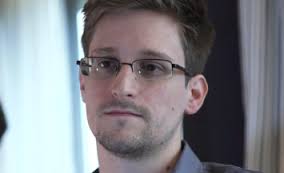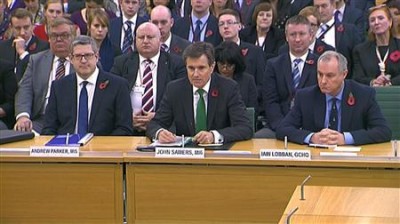 Britain’s intelligence chiefs used their first ever joint public appearance to complain that documents by former U.S. intelligence operative Edward Snowden had put secret operations at risk and were being “lapped up” by al Qaeda.
Britain’s intelligence chiefs used their first ever joint public appearance to complain that documents by former U.S. intelligence operative Edward Snowden had put secret operations at risk and were being “lapped up” by al Qaeda.
In an unprecedented evidence session before parliament that local media likened to a scene from a James Bond film, the heads of Britain’s three main intelligence agencies said Snowden’s disclosures about the mass surveillance they undertake had prompted them to consider being more open about what they do.
But they said parts of their work had to remain secret for national security reasons and that the data leaks, which detailed Britain’s close cooperation with the U.S. National Security Agency (NSA), had caused huge damage.
“The leaks from Snowden have been very damaging, they’ve put our operations at risk,” John Sawers, the head of MI6, Britain’s foreign intelligence service, told parliament.
“It’s clear that our adversaries are rubbing their hands with glee, al Qaeda is lapping it up.”
The robust nature of his comments underlined how angry intelligence chiefs are about Snowden and what they believe is the irresponsible way some newspapers published his information despite warnings not to do so.
The leaks have put intelligence chiefs under pressure to be more open about what they do and have prompted a debate about the balance between security and privacy which has led to calls for greater oversight of the agencies’ work.

Iain Lobban, the director of GCHQ, Britain’s electronic eavesdropping agency, told lawmakers that intelligence chiefs were “actively considering” whether more information should now be shared with the public as a result.
Visibly emotional, he argued however that “certain methods” should remain secret and cited what he said were specific examples where the Snowden data leaks had harmed Britain’s national security.
“We’ve seen terrorist groups in the Middle East, in Afghanistan and elsewhere in south Asia discussing the revelations in specific terms,” he said.
“We have actually seen chat around specific terrorist groups who, even close to home, discuss how to avoid what they now perceive to be vulnerable communications methods, or how to select communications which they now perceive not to be exploitable.”
VEIL OF SECRECY FALLS
The fact that the three intelligence chiefs even appeared in public – the head of MI5, Britain’s domestic security service, was also present – was a first in Britain.
In the past, such hearings have been behind closed doors and it was not until 1992 that the name of the head of MI6, formally known as the Secret Intelligence Service, was publicly known.
Sawers, the current head of MI6, wore a green tie, a nod to a quirky tradition which means that the person doing his job writes in green ink and is known internally as “C”.
The hearing, which lasted about 90 minutes, was televised, albeit with a short delay for security reasons.
Civil liberties groups, parts of the media and lawmakers from all parties have argued that Snowden’s disclosures about the scale of GCHQ’s monitoring activities show it has become too powerful and needs to be reined in.
Prime Minister David Cameron has rejected calls for greater oversight, arguing that it is already subject to proper scrutiny and that its work needs to be kept secret to protect national security.
Angered by Snowden’s disclosures, Cameron has accused the American and British newspapers that have published his information of assisting Britain’s enemies by helping them to avoid surveillance by its intelligence agencies.
He has also threatened to stop future publications if necessary.
Reuters

Leave a Reply
You must be logged in to post a comment.